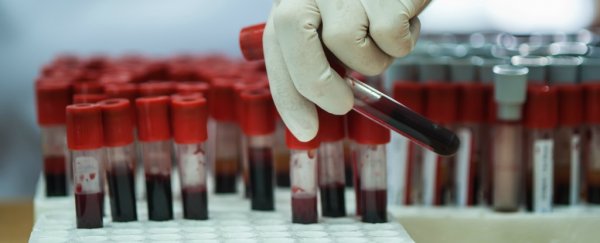Scientists have developed a new blood test that could finally lead to personalised depression treatments for patients, giving doctors a tool that can identify which antidepressants are likely to work for patients the first time around, instead of relying on trial and error.
This could make a huge difference, because the current treatment method for depression – doctors trying out one medication after another until something sticks – isn't effective, with roughly 50 percent of all first-time prescriptions failing to help those in need. And even if a treatment does end up working, it can take weeks to find out either way.
The new test, developed by researchers from King's College London in the UK, can predict if a certain antidepressant would work on an individual patient, before a doctor prescribes it, by looking for two inflammation biomarkers.
These two biomarkers have previously been linked to patients who have a poor response to typical medications. The test can accurately measure how many of these biomarkers a person has, and if they have higher than a certain threshold, they will likely not respond to what's called 'first-line antidepressants' – the ones that doctors typically test first up.
"The identification of biomarkers that predict treatment response is crucial in reducing the social and economic burden of depression, and improving quality of life of patients," lead researcher Carmine Pariante told John von Radowitz from The Independent.
"This study provides a clinically suitable approach for personalising antidepressant therapy - patients who have blood inflammation above a certain threshold could be directed toward earlier access to more assertive antidepressant strategies, including the addition of other antidepressants or anti-inflammatory drugs," he added.
This is a big deal for those living with depression, and those who offer them support.
Mental illness is estimated to cost £105 billion a year (US$151 billion) in the UK, and the World Health Organisation (WHO) says depression will become the second biggest cause of health problems in the entire world by 2020. In other words, this blood test was a long time coming, and mental health organisations around the world are chiming in with support.
"Finding biological markers for depression (and other mental illnesses) has been the holy grail of biological psychiatry," Cosmo Hallstrom from the Royal College of Psychologists in the UK, who was not involved with the research, told Denis Campbell at the The Guardian.
"Such a finding and a test to back it up would be critical to advancing our understanding of the biological causes of depression," he added. "It would accelerate our therapeutic interventions and make them more tailored to the needs of the patient."
The new test will need to undergo significant testing before we see it offered in doctors' offices around the world, but it's definitely a welcome step in the right direction.
The team's findings are reported in The International Journal of Neuropsychopharmacology.
